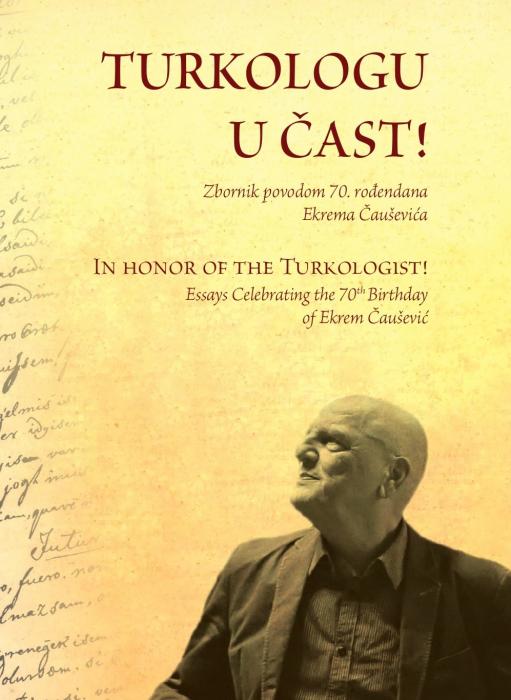In honor of the turkologist! Essays celebrating the 70th birthday of Ekrem Čaušević
Synopsis
Few professions are so closely associated with a specific individual. Few individuals are so attached to their vocations that it is impossible to observe them separately. In Croatia the word turkologist has become almost synonymous with Professor Ekrem Čaušević, a scholar known world-wide, who established the first university program in Turkish studies in the country—hence the title for the collection of essays dedicated to the Professor on the occasion of his 70th birthday. This volume contains twenty-five papers, mostly from the realm of Turkish studies, authored by the Professor’s colleagues, friends and associates. There are many links in it to the honoree—dedications, acknowledgments, and references to his works—eloquent reminders of the influence of his research accomplishments and longstanding successful collaboration with scholars in Turkish studies, Croatian studies, historians and linguists. Contributions authored by junior colleagues in Turkish studies are proof of the Professor’s determination to encourage the most competent students to engage in research. The diverse topics in this volume reflect the extensive research interests of Ekrem Čaušević. The first part, “Philology”, is focused on the area Čaušević contributed to the most. The second part, “History”, contains contributions that do not belong to the research interests of Ekrem Čaušević in the narrower sense. However, historiography still presents a relevant and valuable framework for his linguistic works which include a diachronic perspective as well.
Chapters
-
Uvod
-
Introduction
-
Životopis Ekrema Čauševića
-
Ekrem Čaušević’s Biography
-
Bibliografija Ekrema Čauševića
-
FILOLOGIJA / PHILOLOGY
-
The Emergence, Development and Spread of the First Person Plural Suffix -K and Its Variants in Turkic
-
A Ziker of Polish-Lithuanian-Belarusian Tatars in Turkish and its Polish Translation by Mustafa Szahidewicz
-
Osmanlıcada ‘kucaklamak’ o ile mi u ile mi? / Should ‘kucaklamak’ in Ottoman Texts be Read with o or u?
-
Balkan Slav dillerinden Türkçe hakkında ne öğrenebiliriz? / What Can We Learn about Turkish from the Balkan Slavic Languages?
-
Elements of Türkī-yi ʿacemī in an eyewitness report on the Ottoman siege of Baghdad (1034-35/1625-26) preserved in Iskandar Munşī’s ʿĀlam-ārā-yi ʿAbbāsī
-
Bezekvivalentna leksika i frazeološke jedinice u Novom tursko-srpskom rečniku (Yeni Türkçe-Sırpça Sözlük) / Non-equivalent Lexis and Phraseological Units in the New Turkish– Serbian Dictionary (Yeni Türkçe-Sırpça Sözlük)Leksikološki i leksikografski izazovi / Lexicological and Lexicographical Challenges
-
Türkçe Ses Bilgisi ve Ses Değişmeleri (Sınıflandırma, Çözümleme ve Öğretim Üzerine Yaklaşımlar) / Turkish Phonetics and Sound Changes (Approaches to Classification, Analysis, and Teaching)
-
Pragmatički aspekt turskih vlastitih imena / The Pragmatic Aspect of Turkish Proper Names
-
S infinitnim oblicima kroz Istanbul / With Non-Finite Verb Forms through IstanbulGlagolska imenica na -mA u atributnoj funkciji i njezini hrvatski prijevodni ekvivalenti / The Verbal Noun -mA in the Role of Attribute and Its Croatian Translation Equivalents
-
„Male riječi“ orijentalnoga podrijetla u hrvatskome jeziku / Small Words” of Oriental Origin in the Croatian Language
-
Bilješka o rukometu, dobu i ponovljenom antecedentu u hrvatskome / A Note on Rukomet, Doba, and the Repeated Antecedent in Croatian
-
Xerxov natpis u Persepoli o uništenju svetišta daiva / Xerxes' Persepolis inscription on the destruction of a sanctuary of the Daivas
-
POVIJEST / HISTORY
-
Može li Firdusijeva Šahnama biti izvor za povijest starih turkijskih naroda? / Can Ferdowsi's Shahnameh serve as a source for the history of the ancient Turkic peoples?
-
Bosanski franjevci i osmanski turski jezik u predmoderno doba / Bosnian Franciscans and Ottoman Turkish Language in Pre-Modern Times
-
Hırvat Etnograf Antun Hangi’nin Anlatımlarında Bosna-Hersek Müslümanları ve Günlük Yaşamları / Bosnia-Herzegovina Muslims and Their Daily Lives in the Narrations of the Croatian Ethnographer Antun Hangi
-
Crvena boja u Putopisu Evlije Čelebija / The Colour Red in Evliya Çelebi’s Seyahatname
-
Kodikološko ispitivanje livanjske medžmue, otkrivanje povijesti rukopisa / Codicological Examination of a Mecmua from Livno: Uncovering the History of the Manuscript
-
Corruption, Bribes, or Just Presents? The Practice of Offering Gifts in Ottoman-Hungarian and Ottoman-Romanian Relations
-
Aleksandar Mavrocordatos Exaporite, glavni dragoman i tajni savjetnik Porte: dubrovačka iskustva / Alexander Mavrocordatos Exaporite, Grand Dragoman and Secret Adviser of the Porte: The Dubrovnik Experience
-
Cliometrics Rehabilitated: Inequalities of Wealth and Income in Ottoman Economy as Reflected in Cadastral Surveys
-
Osmanska utvrda Udbina i udbinska nahija u 16. i 17. stoljeću / The Ottoman Fort of Udbina and the Udbina Nâhiye in the sixteenth and seventeenth centuries
-
Tursun Bey Lost in Translation: How a Popular Edition of Târîh-i Ebû’l-Feth Inspired a National Myth
-
Putopis Evlije Čelebija kao izvor za poznavanje džamija i drugih islamskih vjerskih građevina u osmanskoj Hrvatskoj 17. stoljeća / Çelebi's Seyahatnâme as Source of Knowledge about the Mosques and other Islamic Religious Structures in Ottoman Croatia
-
Views and Layers of Late Medieval Anatolia through Bāyezīd Pasha’s Corner of Amasya
-
Bogatstvo i raznovrsnost rabinske literature u Osmanskom Carstvu 18. i 19. stoljeća / The wealth and the diversity of rabbinic literature in the Ottoman Empire during the 18th and 19th centuries
Downloads

Downloads
Published
Categories
License

This work is licensed under a Creative Commons Attribution-NonCommercial-NoDerivatives 4.0 International License.
